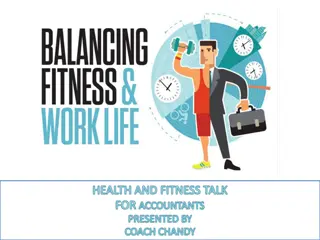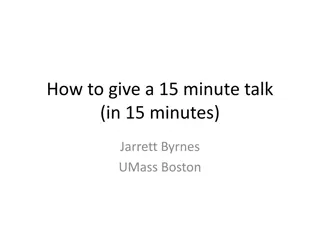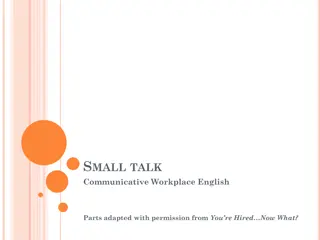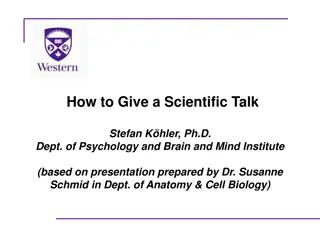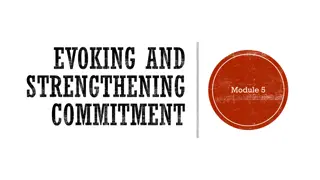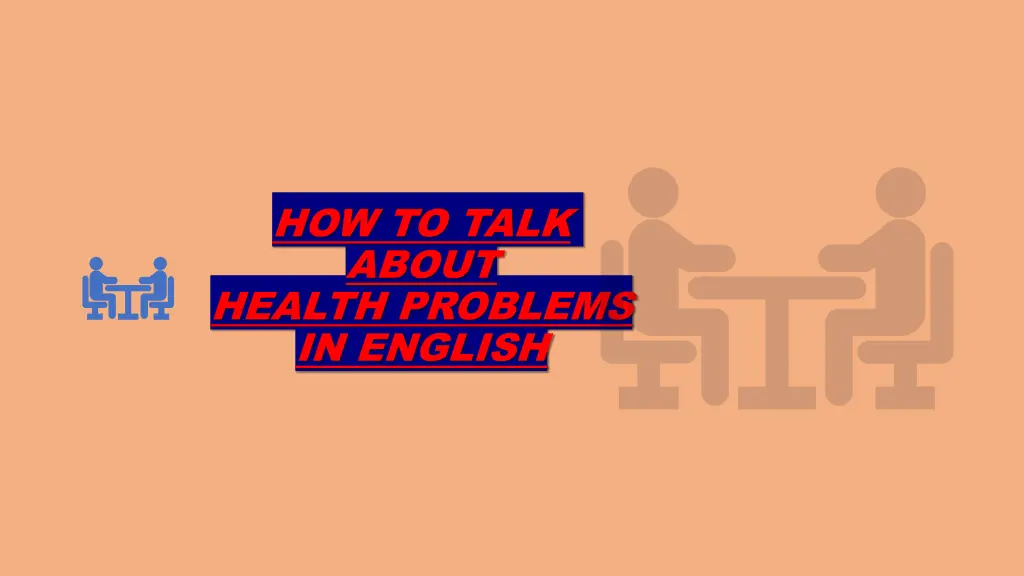
Talk About Health Problems in English
Learn how to discuss health problems in English, ask questions about someone's well-being, provide formal and informal responses, describe symptoms using grammar, and talk about past accidents. Discover common phrases to use when visiting the doctor.
Download Presentation

Please find below an Image/Link to download the presentation.
The content on the website is provided AS IS for your information and personal use only. It may not be sold, licensed, or shared on other websites without obtaining consent from the author. If you encounter any issues during the download, it is possible that the publisher has removed the file from their server.
You are allowed to download the files provided on this website for personal or commercial use, subject to the condition that they are used lawfully. All files are the property of their respective owners.
The content on the website is provided AS IS for your information and personal use only. It may not be sold, licensed, or shared on other websites without obtaining consent from the author.
E N D
Presentation Transcript
HOW TO TALK ABOUT HEALTH PROBLEMS IN ENGLISH
QUESTIONS TO ASK ABOUT SOMEONES HEALTH How do you feel today? How are you feeling? How are you? How are you today? How is it going? Are you all right? Are you not feeling well? Is everything okay? What s the matter? What s wrong? What's wrong with you? What's the matter with you?
FORMAL ANSWERS ARE Very well, thank you. And you? Fine, thank you. INFORMAL ANSWERS ARE Fine, thanks. Not too bad. OK All right. I am tired. I have got a cold. I feel quite better today. I have a slight headache. I'm fine. I feel sick. Not so good. Not very well. I don't feel well. I'm sick.
GRAMMAR TO DESCRIBE YOUR SYMPTONS These are some of the most common ways to talk about the health problems you might have. PRONOUN + HAVE /HAS + AN /AN + HEALTH PROBLEM
AFFIRMATIVE NEGATIVE I have a stiff neck I don t have a stiff neck I have a twisted ankle I don t have a twisted ankle I have an ear infection I don t have an ear infection She has a runny nose She doesn t have a runny nose He has a deep cut He doesn t have a deep cut He has a sore throat He doesn t have a sore throat You have a chest pain You don t have a chest pain They have a broken leg They don t have a broken leg
GRAMMAR TO DESCRIBE AN ACCIDENT YOU HAD When you talk about an accident you had, you have to make those sentences using the SIMPLE PAST. In the following chart, it is shown how to make affirmative and negative sentences using the SIMPLE PAST. PRONOUN + BROKE + MY/ HER/ HIS + HEALTH PROBLEM
AFFIRMATIVE NEGATIVE I broke my leg I didn t break my leg I broke my arm I didn t break my arm She broke her right left She didn t break her right left He broke her right arm He broke his leg He didn t break her right arm He didn t break his leg
OTHER PHRASES TO DESCRIBE YOUR SYMPTONS WHEN GOING TO THE DOCTOR I can t sleep because my head aches too bad I feel very sick, I don t think I can work today. He is covered in Bruises She had such a high temperature Our daughter has been diagnosed with cancer She can t come to school, she s in bed with a cold I think I caught a cold on the ice rink yesterday. She says her stomach is still sore after the operation. He injured his finger when he was cutting the meat. I had such a horrible headache last night that I took two pain killers. I m afraid I m pregnant; I vomit after getting up every morning.
HOW TO GIVE RECOMMENDATIONS ABOUT HEALTH PROBLEMS This is the way to give recommendations to others when they talk about the health problems they have. PRONOUN + SHOULD +VERB + ARTICLE+ RECOMMENDATION
You should drink plenty of water You should take some medicaments She should take antibiotics for eight days before the tooth extraction You shoud drink a hot soup He should wear a knee-pad no matter what physical activity he does You should take vitamin C You should rest You should take some rest You should take a painkiller You should apply a Ice Pack in the back of your neck
These are some other ways to give recommendations You can take an aspirin for pain. You can take some time off You might want to exercise more. You might want to quit drinking You could try drinking more water. You could try resting more I would take some time off if I were you. I would start doing more exercises if I were you You may want to eat less. You may want to quit smoking
LST OF HEALTH PROBLEMS The following is a list of common health problems (ailments and illnesses) with the definition of each word or expression : AN ALLERGY: a medical condition that causes you to react badly or feel sick when you eat or touch a particular substance. ASTHMA: a respiratory condition where spasms in the lungs cause difficulty in breathing. An asthmatic uses an inhaler to calm the spasms. A BACKACHE: a prolonged pain in the back. A BROKEN LEG: when a bone in the leg is broken. A broken leg is put in a cast to help immobilize the leg so that it heals quicker. Other parts of the body with bones can also be broken, for example a broken arm, a broken wrist etc.
CANCER: a serious disease caused by an uncontrolled division of abnormal cells that kill normal body cells in a part of the body. A COLD: a common viral infection which causes mucus to run from the nose, gives a sore throat and often includes sneezing. A COUGH: the act of expelling air from the lungs with a sudden sharp sound. DIARRHOEA: (America English: diarrhea) an illness in which faeces are discharged from the bowels frequently and in a liquid form. AN EARACHE: pain inside the ear. A FEVER: an abnormally high body temperature, usually accompanied by shivering and a headache. THE FLU: flu is the common name given for influenza. It is a contagious viral infection of the respiratory passages that causes fever and sever aching. A HEADACHE: a continuous pain in the head. HEARTBURN: a form of indigestion felt as a burning sensation in the chest. It is caused by acid regurgitation into the esophagus.
(THE) MEASLES: an infectious viral disease causing fever and a red rash on the skin. It typically occurs in childhood. A RASH: a lot of small red spots on the skin that are usually itchy. A SORE THROAT: a condition of pain in the throat, typically caused by inflammation of it. A SPRAIN: an injury to a joint in your body, especially your wrist or ankle, caused by suddenly twisting it. A STOMACHACHE (US) - STOMACH ACHE (Brit): The pain in a person's belly. Notice how the word can be spelled together or as two words, depending on the country. SUNBURN: when the skin becomes red with inflammation as a result of overexposure to the ultraviolet rays of the sun. A TOOTHACHE: the pain in a tooth or teeth.
THE DIFFERENCE BETWEEN SICK AND ILL To most people, both sick and ill more or less mean the same thing, that you are not in a healthy condition. SICK is less formal than ILL and usually describes short-term ailments or diseases (like a cold or cough). Sick can also refer to feeling nauseous. In British English, TO BE SICK can mean TO VOMIT. ILL is often for more serious health problems (like cancer or pneumonia) but can also be used for short-term ones. ILLNESS (noun) refers to a medical condition. SICKNESS (noun) refers to how you feel.
THE DIFFERENCE BETWEEN ACHE AND PAIN ACHE is a continuous or prolonged dull pain in a part of the body. It can often be a throbbing sensation that covers more than one point. You can sometimes try and ignore an ache. PAIN is physical suffering or discomfort caused by illness or injury. It is usually a sharp sensation in a specific part of the body and hurts more than an ache.
DISEASES, DISORDERS AND INJURIES SKIN: skin irritation, skin inflammation, redness, tenderness, swelling, rash, itching, acne, pimple, blister, burn, scar, scratch EYE: nearsightedness, farsightedness,conjunctivitis, , cataract. EAR: wax blockage, hearing loss, earache, ruptured eardrum. NOSE, THROAT, LUNGS: nosebleed, runny nose, stuffy nose, rhinitis, hay fever, sinusitis, a cold, laryngitis, bronchitis, pneumonia, asthma. HEART and CIRCULATION: high blood pressure, heart disease, heart failure, heart attack, cardiac arrest. BLOOD: anemia, bleeding, internal bleeding, hemorrhage, leukemia. BRAIN and NERVOUS SYSTEM: headache, migraine, dizziness , meningitis, epilepsy, convulsions, seizure, stroke, paralysis, cerebral palsy, dementia. NUTRITION: vitamin deficiency , obesity, to be overweight, weight loss, anorexia, bulimia.
STOMACH, INTESTINES: indigestion, upset stomach, diarrhea, nausea, vomiting, gastritis, colitis, appendicitis, cholera. LIVER: hepatitis, , cirrhosis. KIDNEYS: kidney stones. BONES, JOINTS: backache / back pain,osteoporosis, arthritis. MUSCLES: muscle spasm, muscle cramp, muscular dystrophy, hernia. INJURIES: injury, wound, trauma, hand injury, knee injury, foot injury, head injury, concussion, contusion, fracture, fractured bone, sprained ankle, bruise to have a broken arm. GENERAL INFECTIONS: the flu / influenza, tuberculosis, tetanus, rabies, yellow fever,, smallpox, anthrax. INFECTIOUS DISEASES: measles, polio, chicken pox, scarlet fever. HORMONAL DISORDERS: diabetes.
ONCOLOGY: benign tumor, malignant tumor, cancer, lung cancer, breast cancer, stomach cancer, skin cancer. MENTAL DISORDERS: depression, phobia, schizophrenia. ADDICTIONS: alcohol abuse, drug abuse.
TYPES OF DOCTORS These are some of the kind of doctors that you will find working in a CLINIC or HOSPITAL CARDIOLOGIST: A heart doctor DERMATOLOGIST: A skin doctor DENTIST: A doctor who treats teeth OBSTETRICIAN: A doctor for female patients before and during pregnancy (c OPTOMETRIST: An eye doctor ORTHOPEDIC DOCTOR: A doctor who specialise in bones PEDIATRICIAN: A doctor for children SURGEON: A doctor who performs operations





